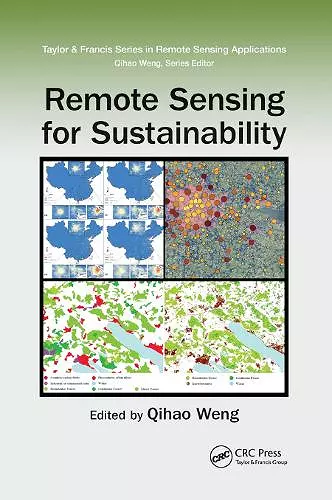Remote Sensing for Sustainability
Format:Paperback
Publisher:Taylor & Francis Ltd
Published:12th Dec '19
Currently unavailable, and unfortunately no date known when it will be back
This paperback is available in another edition too:
- Hardback£195.00(9781498700719)

Driven by the societal needs and improvement in sensor technology and image processing techniques, remote sensing has become an essential geospatial tool for understanding the Earth and managing Human-Earth interactions. Remote Sensing for Sustainabilityintroduces the current state of the art remote sensing knowledge integral for monitoring the world’s natural resources and environments, managing exposure to natural disasters and man-made risks, and helping understand the sustainability and productivity of natural ecosystems.
Bridging the gap between remote sensing and sustainability science this book examines theories and methods as well as practical applications of sustainable development for cities using remote sensing; focuses on remote sensing methods and techniques for sustainable natural resources with emphasize on forests; answers questions on how and what the remote sensing methods and techniques can do for the sustainability of environmental systems; and examines the issues of energy use and sustainable energy sources using remote sensing technology in countries such as Germany, China, the U.S, drawing on case studies to demonstrate the applicability of remote sensing techniques.
This comprehensive guide, which can serve to professors, researchers, and students alike, takes in consideration the United Nations set of sustainable development goals and intends to contribute to the GEO’s Strategic Plan by addressing and exemplifying a number of societal benefit areas of remote sensing data sets, methods, and techniques for sustainable development.
"This excellent book presents the use of remote sensing in the context of sustainability and cities in areas such as land subsidence, grassland management, Tree Species, Forest Damage, Water Quality, Air Quality, Heat Hazards, Soil Moisture, Energy Supply and Use, Wind and Solar Energy Resources. Since urban growth affects earth systems, which are innately complex in space and time, continued innovative approaches will be needed to advance sustainable development for cities in the future; and the many authors here employ a variety of remote sensing technologies and analyses to advance our basic understandings for this overall endeavor. The book is extremely valuable for students, faculty, and basic and applied researchers in both remote sensing and sustainability. As the author of Chapter 1 (J. Trinder) says: ‘A great deal has yet to be learnt about these processes and how the full potential of remote sensing can be achieved in this very important issue of environmental sustainability of urban areas.’ The book goes a long way to advance this learning with its timely chapter offerings and a top rate author selection of scientists and practitioners."
—Anthony J. Brazel, Arizona State University, Tempe, Arizona, USA
ISBN: 9780367871406
Dimensions: unknown
Weight: 660g
357 pages